book report of the room with a view
高考情态动词归纳
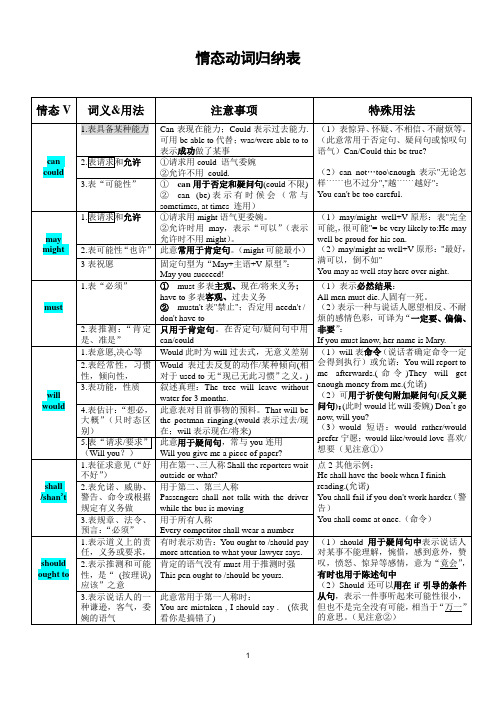
情态动词归纳表情态V词义&用法注意事项特殊用法can could 1.表具备某种能力Can表现在能力;Could表示过去能力.可用be able to代替;was/were able to to表示成功做了某事(1)表惊异、怀疑、不相信、不耐烦等。
(此意常用于否定句、疑问句或惊叹句语气)Can/Could this be true?(2)can not…too\enough表示"无论怎样``````也不过分","越``````越好":You can't be too careful.2.表请求和允许①请求用could 语气委婉②允许不用could.3.表“可能性”①can用于否定和疑问句(could不限)②can (be)表示有时候会(常与sometimes, at times 连用)may might 1.表请求和允许①请求用might语气更委婉。
②允许时用may,表示“可以”(表示允许时不用might)。
(1)may/might well+V原形:表"完全可能,,很可能"= be very likely to:He maywell be proud for his son.(2)may/might as well+V原形:"最好,满可以,倒不如"You may as well stay here over night.2.表可能性“也许”此意常用于肯定句。
(might可能最小)3表祝愿固定句型为“May+主语+V原型”:May you succeed!must 1.表“必须”①must多表主观、现在/将来义务;have to多表客观、过去义务②mustn't表"禁止";否定用needn't /don't have to(1)表示必然结果:All men must die.人固有一死。
高二英语学术生活单选题30题
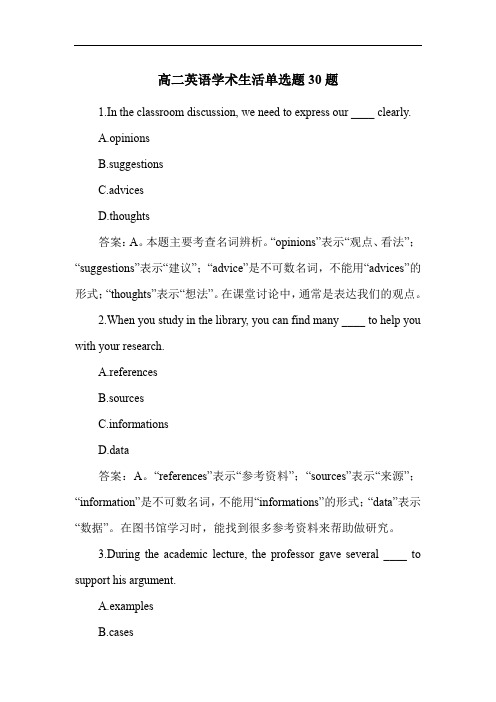
高二英语学术生活单选题30题1.In the classroom discussion, we need to express our ____ clearly.A.opinionsB.suggestionsC.advicesD.thoughts答案:A。
本题主要考查名词辨析。
“opinions”表示“观点、看法”;“suggestions”表示“建议”;“advice”是不可数名词,不能用“advices”的形式;“thoughts”表示“想法”。
在课堂讨论中,通常是表达我们的观点。
2.When you study in the library, you can find many ____ to help you with your research.A.referencesB.sourcesrmationsD.data答案:A。
“references”表示“参考资料”;“sources”表示“来源”;“information”是不可数名词,不能用“informations”的形式;“data”表示“数据”。
在图书馆学习时,能找到很多参考资料来帮助做研究。
3.During the academic lecture, the professor gave several ____ to support his argument.A.examplesB.casesC.instancesD.samples答案:A。
“examples”表示“例子”;“cases”表示“情况、案例”;“instances”表示“例子、事例”,与“examples”意思相近但较正式;“samples”表示“样本”。
教授在讲座中通常会给出几个例子来支持论点。
4.In academic research, accurate ____ is crucial for a reliable conclusion.A.detailsB.factsC.realitiesD.truths答案:B。
九年级英语第九单元知识点

九年级英语第九单元知识点一、重要词汇1.invent 动词,(1)发明,创造Who invented the TV set ?The telephone was invented in 1876.(2) 虚构,杜撰I invented a story .The whole story was invented .inventor 名词,指人,“发明家,创造者”I want to be a famous inventor when I grow up .invention 名词,指物,“发明,创造”I think the computer is the most useful invention .Thomas Edison was a great American inventor . He invented more than 1000 inventions during his life .2.operate 动词(1)操作,作业,;实施手术;operate on sb. 给某人做手术The workers are operating in deep water .The doctor is operating on the eyes of the patient .(2)操作,开动(机器等);经营,管理His brother operates the machine .The man operates a factory .3. It is better to do sth .最好做某事It is cold outside . It is better for you to wear warm clothes .== It is cold outside . It is better that you should wear warm clothes .4. used to be 过去怎么样,表示一种状态He used to be very thin and short .be used to do 过去常常做某事They used to swim in the river .be used to sth 习惯于某物He is used to the weather here .be used to doing sth 习惯于做某事He is used to getting up early .be used for doing sth===be used to do sth 被用于做某事This knife is used for cutting things . == This knife is used to cut things.be used as 被当作、、、、、、使用This box is used as a table5. mistake 名词,“错误,误会”;make a mistake , make some mistakes 犯错误I made some mistakes in my English exam .Don’t make such a foolish mistake again .by mistake 误拿,误做,误用Jim ate his sister’s cake by mistake .He put salt into his tea by mistake .I took your umbrella by my mistake .mistake …for …把……错当成……We always mistake Lily for Lucy .6. sprinkle 动词,“撒,洒”Sprinkle sth on \ over sth == sprinkle sth. with sth.把……撒在……上Sprinkle a few herbs (芳草调料) on the pizza .== Sprinkle the pizza with a few herbs .He sprinkled some water on the baby’s head .=== He sprinkled the baby’s head with some water .7. by accident 意外地,偶然地=== by chanceI met one of my friends on the street by accident yesterday .8. according to 根据,依照According to the weather report , it will be snowy today .According to the passage , which sentence is right ?9. fall into 陷入,落入Be careful , or you’ll fall into the river .fall off (从某处)下降,跌落He fell off his bike yesterday .fall down 跌倒,倒塌The little boy fell down just now .fall behind 落后,跟不上You must try your best , or you’ll fall behind others .fall asleep 入睡He was tired and fell asleep soon .10. sometimes , some times , sometime , some time 的区别(1) sometimes 有时候, 偶尔, 用于一般现在时和一般过去时He was sometimes late for school .(2) some times 几次, 几倍表示次数或倍数She came home some times .(3) sometime 某时, 用于一般现在时和一般过去时He came here sometime .( 4) some time 一段时间, 用于多种时态He will stay there for some time .11. notice 动词,“注意到,觉察到”notice sb\ sth I didn’t notice you when I entered .notice + that 从句He noticed that someone kept looking at him .notice sb. do sth 注意到某人做了某事或经常做某事Did you noticed anyone take the book away ?notice sb doing sth注意到某人正在做某事We noticed a number of people standing at the entrance .12.in this way 用这种方法, 这样In this way , you’ll find the answer to the question easily .The song was produced in this way .in many ways 在许多方面This way , please . 请走这边。
五年级下册英语第四单元至第六单元所有单词,要一个不漏,还要包含中文意思,时间限期3天。
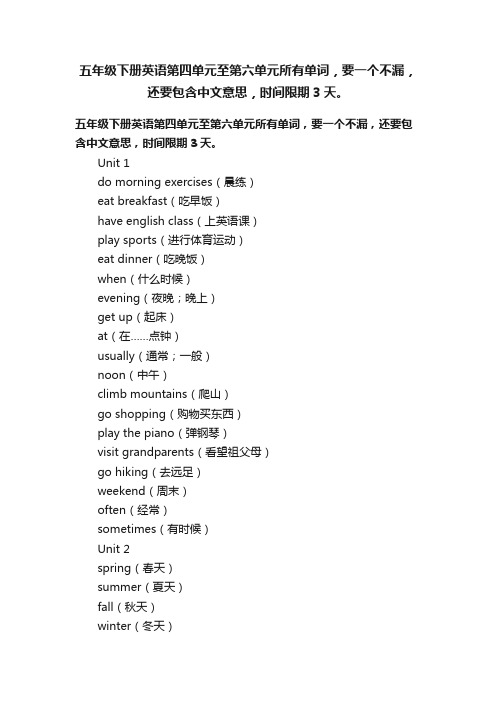
五年级下册英语第四单元至第六单元所有单词,要一个不漏,还要包含中文意思,时间限期3天。
五年级下册英语第四单元至第六单元所有单词,要一个不漏,还要包含中文意思,时间限期3天。
Unit 1do morning exercises(晨练)eat breakfast(吃早饭)have english class(上英语课)play sports(进行体育运动)eat dinner(吃晚饭)when(什么时候)evening(夜晚;晚上)get up(起床)at(在……点钟)usually(通常;一般)noon(中午)climb mountains(爬山)go shopping(购物买东西)play the piano(弹钢琴)visit grandparents(看望祖父母)go hiking(去远足)weekend(周末)often(经常)sometimes(有时候)Unit 2spring(春天)summer(夏天)fall(秋天)winter(冬天)season季节)which(哪一个)best(最;极)swim(游泳)fly kites(放风筝)skate(滑冰;滑冰鞋)make a snowman(堆雪人)plant trees(种树)why(为什么)because(因为)sleep(睡觉)Unit 3Jan./January(一月)Feb./February(二月)Mar./March(三月)Apr./April(四月)May(五月)June(六月)July(七月)Aug./August(八月)Sept./September(九月)Oct./October(十月)Nov./November(十一月)Dec./December(十二月)birthday(生日)uncle(叔叔;舅舅)her(她的)date(日期)Unit 4draw pictures(画画)cook dinner(做饭)read a book(看书)answer the phone(接电话)listen to music9(听音乐)clean the room(打扫房间)write a letter(写信)write an e-mail(写电子邮件)mom(妈妈)grandpa(爷爷;外公)study(书房)Unit 5fly(飞)jump(跳)walk(走)run(跑)swim(游泳)kangaroo(袋鼠)sleep(睡觉)climb(往上爬)fight(打架)swing(荡;荡秋千)drink water(喝水)Unit 6take pictures(照相)watch insects(观察昆虫)pick up leaves(采摘树叶)do an experiment(做实验)catch butterfly(捉蝴蝶)honey(蜂蜜)count insects(数昆虫)collect leaves(收集树叶)write a report(写报告)play chess(下棋)have a piic(举行野餐)是这个么?pep五年级英语上册第四单元所有单词Unit 1:Young (年轻的)funny (滑稽可笑的)tall (高的)strong (强壮的) kind (和蔼的、亲切的) old (年老的) short(矮的)thin (瘦的) Mr (先生) like (像、喜欢) strict (严格的) *** art (聪明的、巧妙的) active (积极的、活跃的) quiet (安静的、文静的)very(很、非常) but (但是)Unit 2:Mondy (星期一) Tuesday (星期二) Wednesday (星期三)Thursday(星期四)Friday (星期五)Saturday (星期六)Sunday (星期天)day (天)have (有、吃)on (在…..时候)do homework (做作业)watch TV (看电视) read books (读书)Unit 3:eggplant (茄子) fish (鱼) green beans (青豆) tofu (豆腐)potato (土豆) tomato (西红柿) for (为) lunch (中餐)we(我们) tasty (好吃的) sweet (甜的) sour (酸的) fresh (新鲜的) salty (咸的) favourite (最喜欢的) they are (他们是)fruit (水果) grape (葡萄)Unit 4:Cook the meals () water the flowers (浇花) sweep the floor (扫地) clean the bedroom (打扫卧室) make the bed(铺床) set the table (摆饭桌)wash the clothes (洗碗碟) do the dishes (收拾衣服) use a puter (使用计算机)Unit 5:curtain (空调) trash bin (垃圾箱) closet (壁橱) mirror (镜子) end table (床头柜) bedroom (卧室) kitchen (厨房)bathroom (卫生间)living room (客厅)in (在…里面)on (在…上面) under (在…下面) near (在..旁边) behind (在…后边)clothes (衣服)Unit 6:river (河流) flower (花) grass (草) lake (湖泊) forest (森林) path (路) pake (公园) picture (照片) hourse (房子)bridge (桥) tree (树) road (公路) building (建筑物)clean (干净的)五年级下册英语单词第四单元PEP五年级上册四会单词词汇表 Unit 1 Young (年轻的) funny (滑稽可笑的) tall (高的) strong (强壮的) kind (和蔼的、亲切的) old (年老的) short (矮的)thin (瘦的)Mr (先生) like (像、喜欢)strict (严格的)*** art (聪明的、巧妙的)active (积极的、活跃的)quiet (安静的、文静的)very (很、非常)but (但是)Unit 2 Mondy (星期一)Tuesday (星期二)Wednesday (星期三)Thursday (星期四)Friday (星期五)Saturday (星期六) Sunday (星期天) day (天) have (有、吃)on (在…..时候) do homework (做作业) watch TV (看电视)read books (读书) Unit 3 eggplant (茄子) fish (鱼) green beans (青豆) tofu (豆腐) potato (土豆) tomato (西红柿)for (为) lunch (中餐) we (我们) tasty (好吃的) sweet (甜的) sour (酸的) fresh (新鲜的) salty (咸的) favourite (最喜欢的) they are (他们是) fruit (水果) grape (葡萄) Unit 4 Cook the meals (倒垃圾) water the flowers (浇花) sweep the floor (扫地) clean the bedroom (打扫卧室) make the bed (铺床) set the table (摆饭桌)wash the clothes (洗碗碟) do the dishes (收拾衣服) use a puter (使用计算机 Unit 5 curtain (空调)trash bin (垃圾箱)closet (壁橱)mirror (镜子)endtable (床头柜)bedroom (卧室)kitchen (厨房)bathroom (卫生间) living room (客厅) in (在…里面) on (在…上面)under (在…下面) near (在..旁边) behind (在…后边) clothes (衣服) Unit 6 river (河流) flower (花) grass (草) lake (湖泊) forest (森林) path (路) pake (公园) picture (照片)hourse (房子) bridge (桥) tree (树) road (公路) building (建筑物) clean (干净的) PEP五年级下册四会单词词汇表 Unit 1 do morning exercises(晨练)eat breakfast(吃早饭)have english class(上英语课) play sports(进行体育运动) eat dinner (吃晚饭) when(什么时候) evening(夜晚;晚上) get up(起床)at(在……点钟)usually(通常;一般)noon(中午)climb mountains(爬山) go shopping(购物;买东西) play the piano (弹钢琴) visit grandparents(看望祖父母) go hiking(去远足)weekend(周末)often(经常)sometimes(有时候)Unit 2 spring(春天)summer(夏天)fall(秋天)winter(冬天)season季节)which(哪一个)best(最;极)swim(游泳)fly kites(放风筝) skate(滑冰;滑冰鞋) make a snowman(堆雪人)plant trees(种树) why(为什么) because(因为) sleep(睡觉)Unit 3 Jan./January(一月)Feb./February(二月)Mar./March (三月) Apr./April(四月) May(五月) June(六月) July(七月)Aug./Augest(八月) Sept./September(九月) Oct./October(十月)Nov./November(十一月)Dec./December(十二月)birthday(生日)uncle(叔叔;舅舅)her(她的)date(日期)Unit 4 draw pictures(画画)cook dinner(做饭)read a book (看书)answer the phone(接电话)mom(妈妈)listen to music9(听音乐) clean the room(打扫房间) write a letter(写信) write an e-mail(写电子邮件) grandpa(爷爷;外公) study (书房) Unit 5 fly(飞) jump(跳) walk(走) run(跑) swim (游泳)kangaroo(袋鼠)sleep(睡觉)climb(往上爬)fight (打架)swing(荡;荡秋千)drink water(喝水)Unit 6 takepictures(照相) watch insects(观察昆虫) pick up leaves(采摘树叶)do an experiment(做实验)catch butterfly(捉蝴蝶)honey(蜂蜜)count insects(数昆虫)collect leaves(收集树叶)wtite a report(写报告) play chess(下棋) have a piic(举行野餐)求八年级下册第六单元所有单词!我可是第一个回答的,请楼主开恩选我吧! S O S!!单词:1. collect 收集;蒐集2. shell 贝壳;壳3. marathon 马拉松赛跑;马拉松式活动4. pair 一对;一双5. skate 溜冰鞋6. since 自从;自······以来7. Hill School 一学校名称,可译为山顶学校8. raise 筹集;筹募9. several 几个的;数个的10.skater 溜冰者11.stamp 邮票12.kite 风筝13.monster 怪物;妖怪14.globe 球状物;球体15.anyone 任何人16.run out of 用完;用尽17.store 储存18.cake 蛋糕;糕;饼类食品19.particularly 特别;尤其;异乎寻常的20.collector 蒐集者;收藏者21.by the way 顺便一提;附带说说22.mon 共同的;公共的23.extra 额外的24.coin 钱币;硬币25.ic 话题;主题26.been 动词be的过去分词27.be interested in 对······感兴趣28.writer 作家;作者29.dynasty 朝代;王朝30.character (著名的)人物;名人31.capital 省会;首都32.European 欧洲的;欧洲人的;欧洲人33.Russian 俄罗斯的;俄罗斯人的;俄语的;俄罗斯人;俄语34.Australian 澳大利亚的;澳大利亚人的;澳大利亚人35.Jewish 犹太人的;犹太族的36.Jew 犹太人;犹太教徒37.thousand 一千38.emperor 皇帝39.foreigner 外国人40.quite 相当;十分41.centain 确实的;无疑的42.the Olmpic Games 奥林匹克运动会43.far away 在远处44.miss 思念;想念人名:45.Alison 艾利森46.Celia 西莉亚47.Liam 利亚姆48.Ellen 艾伦49.Leo 利奥五年级下册英语第六单元课文《insanya》A: the students on the playground, they are having A PElesson, the teacher is calling the shots, the students try to do aording to the requirements of the teacher.Teacher: ma in a row, please. Let's do some exercise.Students: yes, ma teacher.Teacher ma: o feet together, jump up and down ten times.Students: yes, ma teacher.Ma teacher: now, listen to clear. Put your hands on your head, turn around continuous, do ten times.Students: yes, ma teacher.Teacher ma: fine, s!Ma teacher: boys and girls, lie back. Now, lift up your left foot, and then with his right hand to touch the left foot. Then lift up your right foot and use your left hand to touch your right foot, do ten times.Students: yes, ma teacher.Ma teacher: now, all the people, do you feel tired?Students: yes.英语五年级上册译林版第六单元Cartoon time的中文意思cartoon 就是卡通、漫画的意思。
外研版小学英语1-6年级全册单词表
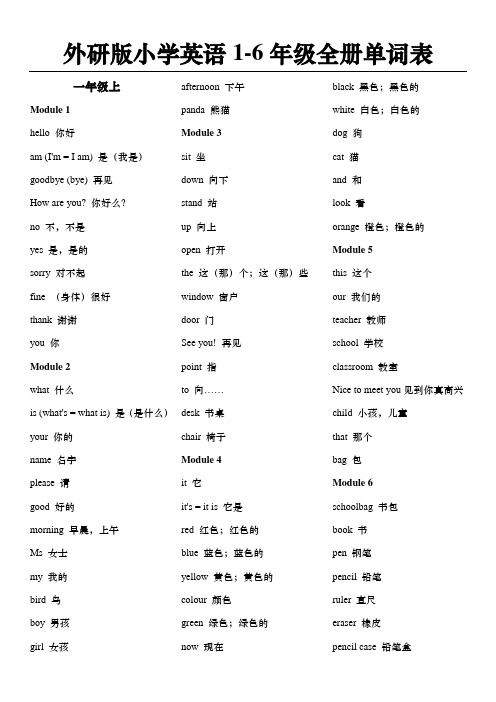
一年级上Module 1hello 你好am (I'm = I am) 是(我是)goodbye (bye) 再见How are you? 你好么?no 不,不是yes 是,是的sorry 对不起fine (身体)很好thank 谢谢you 你Module 2what 什么is (what's = what is) 是(是什么)your 你的name 名字please 请good 好的morning 早晨,上午Ms 女士my 我的bird 鸟boy 男孩girl 女孩afternoon 下午panda 熊猫Module 3sit 坐down 向下stand 站up 向上open 打开the 这(那)个;这(那)些window 窗户door 门See you! 再见point 指to 向……desk 书桌chair 椅子Module 4it 它it's = it is 它是red 红色;红色的blue 蓝色;蓝色的yellow 黄色;黄色的colour 颜色green 绿色;绿色的now 现在black 黑色;黑色的white 白色;白色的dog 狗cat 猫and 和look 看orange 橙色;橙色的Module 5this 这个our 我们的teacher 教师school 学校classroom 教室Nice to meet you见到你真高兴child 小孩,儿童that 那个bag 包Module 6schoolbag 书包book 书pen 钢笔pencil 铅笔ruler 直尺eraser 橡皮pencil case 铅笔盒crayon 蜡笔Module 7new 新的kite 风筝or 或者not (isn't = is not) 不(不是)monkey 猴子monster 怪物help 救命(呼救用语)house 房屋,住宅box 箱,盒Module 8how many 多少one 一two 二three 三four 四count 数say 说five 五six 六seven 七eight 八nine 九ten 十pink 粉色;粉色的ball 球so 这么,那么many 许多brown 棕色;棕色的Module 9how old 多大are 是too 也happy 快乐的birthday 生日but 但是,可是for 为,给,对You're welcome! 不客气!Module 10father 父亲daddy 爸爸mother 母亲grandpa 祖父;外祖父grandma 祖母;外祖母friend 朋友his 他的car 汽车,轿车sister 姐妹brother 兄弟her 她的一年级下Module 1he(heis=he’s)他(他是)doctor医生she(she is=she’s)她她是me我(宾格)nurse护士driver司机policeman警察pupil学生小学生Module 2Where/where's=where is哪里/在哪里in在……里on在……上under在…… 下toy玩具bed床look at看bear熊Module 3eleven十一twelve十二don't=do not不know知道other其他的fish鱼tree树let's=let us让我们Module 4head头touch触摸nose鼻子face脸ear耳朵mouth嘴eye眼睛body身体these这些leg腿hand手foot feet(复数)脚足baby婴儿Module 5they他(她/它)们they're=they are他(她/它)们是cow奶牛pig猪farm农场duck鸭子chichen鸡egg鸡蛋thin瘦的very很,非常fat胖的big大的little小的Module 6snake蛇short矮的短的small小的elephant大象go去zoo动物园long长的giraffe长颈鹿tall高的tiger老虎cute可爱的乖巧的strong强壮的horse马aren't=are not不不是Module 7there is有,存在animal动物can可以,能see看见there are有,存在(复数)help帮助over there在那边table桌子we我们some一些Module 8a pair of一双… 一对…shorts(常复)短裤shirt衬衫shoe鞋子swim游泳sock短袜put on穿上,戴上clothers(常复)衣服here这里football足球(运动)basketball篮球(运动)ping-pong乒乓球(运动)Module 9like喜欢lion狮子them他(她/它)们(宾格)all全部,所有play参加(运动、比赛)玩耍with用……together一起favourite最喜欢的,最喜爱的swimming游泳(运动)Module 10idea主意,想法hot热的go swimming去游泳sing唱,唱歌dance跳舞tired累的,疲惫的二年级上Module 1song 歌曲come on 加油;快点team 球队,运动队Module 2meat 肉noodles (常复)面条rice 米饭sweets (常复)糖果children(child复数)孩子们ginger 姜nice 好的onion 洋葱ice cream 冰淇淋Module 3banana 香蕉apple 苹果milk 奶,牛奶orange 柑橘,橙fruit 水果milkshake 奶昔Here you are. 给你。
Unit4 section A知识点精讲精练-英语九年级全一册教材知识点精讲精练(人教新目标版)

Unit4 section A一、知识点讲解1.see sb. doing sth. 看见某人正在做某事此结构中doing sth.作宾语补足语,强调动作正在进行。
而see sb. do sth. 看见某人做了某事,强调看见动作发生的全过程或看到动作经常发生。
例句:I saw him playing football . 我看见他正在踢足球。
例句:I saw her run into the classroom. 我看见她跑进教室去了。
2. interview /'ɪntə(r)vjuː/ v. 采访;面试n. 面试;访谈interview作动词时,后接某人作宾语,表示"采访某人,面试某人",短语interview sb. about sth.采访某人某事例句:Peter interviewed Mr White yesterday. 彼得昨天采访了怀特先生。
interviewer n. 面试者;采访者interviewee n. 被访问者;被采访者3.require /rɪ’ kwaɪə(r)/ v. 需要;要求require通常不用于进行时;require常用在"require+宾语+动词不定式"结构中。
例句:They required me to keep silent. 他们要求我保持沉默。
4.advise v. 建议advise sb. (not) to do sth.建议某人(不要)做某事例句:The boss advised him to leave as soon as possible. 老板建议他尽快离开。
【拓展】advise doing sth. 建议做某事例句:He advised leaving early. 他建议早动身。
【辨析】advise v. 建议advice n. 建议(不可数名词)5.silent /’ saɪlənt/ adj.不说话的;沉默的例句:My brother used to be silent. 我哥哥过去不爱说话。
新编实用英语综合教程第二册第四单元
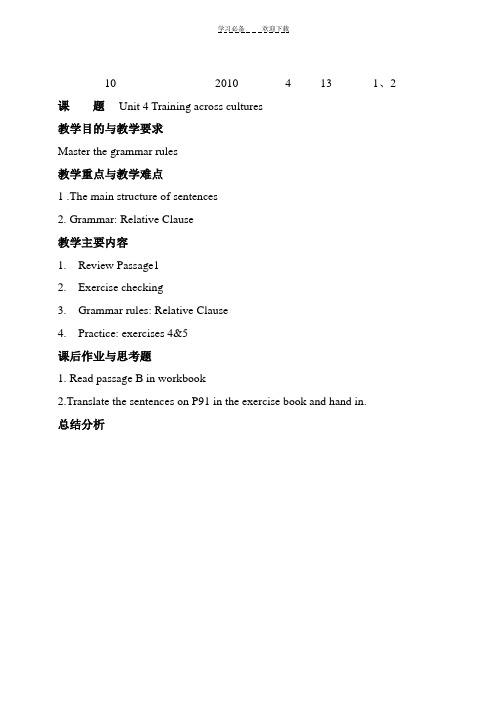
10 2010 4 13 1、2 课题Unit 4 Training across cultures教学目的与教学要求Master the grammar rules教学重点与教学难点1 .The main structure of sentences2. Grammar: Relative Clause教学主要内容1. Review Passage12. Exercise checking3. Grammar rules: Relative Clause4. Practice: exercises 4&5课后作业与思考题1. Read passage B in workbook2.Translate the sentences on P91 in the exercise book and hand in.总结分析教学过程教学环节与时间分配I. Review Words1. Ss are asked to speak out important words and phrases.2. Do some oral translation work3. DictationII. Check exercises on P85-86.III. Relative Clause定语从句在句中用作定语的从句称为定语从句。
定语从句通常位于它所修饰的名词或代词之后,这种名词或代词称为先行词。
引导定语从句的关联词为关系副词。
关系代词在定语从句中可用作主语、宾语、表语、介词宾语和定语等,关系副词在定语从句中只用作状语。
1. 由关系代词who,whom,whose,which,that引导的定语从句1) who 代替人,在从句中作主语。
A man who does not try to learn from others cannot hope to achieve much.一个不向别人学习的人是不能指望有多大成就的。
一个空空的房间英语绘本英语读后感
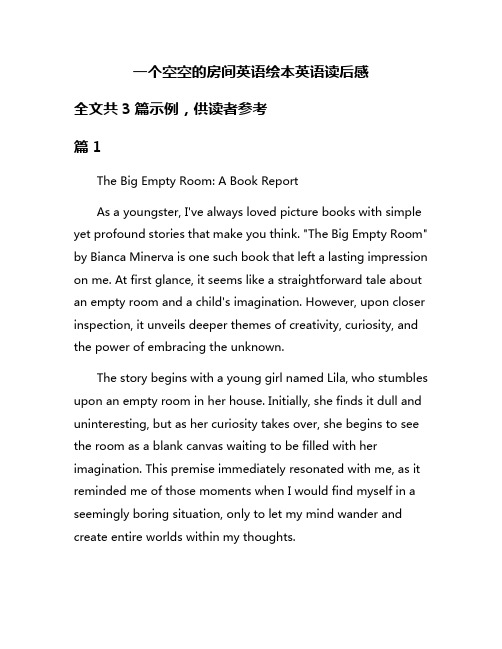
一个空空的房间英语绘本英语读后感全文共3篇示例,供读者参考篇1The Big Empty Room: A Book ReportAs a youngster, I've always loved picture books with simple yet profound stories that make you think. "The Big Empty Room" by Bianca Minerva is one such book that left a lasting impression on me. At first glance, it seems like a straightforward tale about an empty room and a child's imagination. However, upon closer inspection, it unveils deeper themes of creativity, curiosity, and the power of embracing the unknown.The story begins with a young girl named Lila, who stumbles upon an empty room in her house. Initially, she finds it dull and uninteresting, but as her curiosity takes over, she begins to see the room as a blank canvas waiting to be filled with her imagination. This premise immediately resonated with me, as it reminded me of those moments when I would find myself in a seemingly boring situation, only to let my mind wander and create entire worlds within my thoughts.As Lila starts to envision different scenarios within the empty room, the book's illustrations come alive with vibrant colors and whimsical details. One moment, the room transforms into a lush forest filled with towering trees and exotic animals. The next, it becomes a vast ocean teeming with marine life, complete with friendly dolphins and majestic whales. Minerva's artwork is truly captivating, and it perfectly captures the boundless potential of a child's imagination.What struck me the most, however, was the underlying message about embracing the unknown. Throughout the book, Lila fearlessly explores the room's ever-changing landscapes, embracing each new adventure with an open mind and a sense of wonder. This reminded me of how often we, as adults, tend to shy away from the unfamiliar, clinging to our comfort zones and dismissing the unknown as something to be feared.Yet, as Lila's journey unfolds, we see that it is precisely by embracing the unknown that she discovers the true magic of the world around her. Whether she's soaring through the clouds on the back of a friendly dragon or exploring a bustling city filled with towering skyscrapers, each new experience brings with it a sense of excitement and curiosity.One particular spread that left a lasting impression on me was when Lila found herself in a vast, starry expanse of space. As she gazed up at the twinkling celestial bodies, she remarked, "The universe is so big, and I'm so small. But even the smallest stars can shine bright." This simple yet profound statement reminded me of the importance of embracing our individuality and pursuing our passions, no matter how insignificant they may seem in the grand scheme of things.As the book neared its conclusion, I found myself feeling a bittersweet mixture of joy and sadness. While I was excited to see what other adventures awaited Lila, I also knew that her time in the big empty room would eventually come to an end. However, the final pages offered a beautiful reminder that the true magic lies not in the physical space itself, but in the boundless potential of our own imaginations.In the end, Lila emerges from the room with a newfound appreciation for the world around her, and a renewed sense of curiosity and wonder. As she steps back into the "real" world, she carries with her the lessons she learned within the empty room, ready to approach each new day with an open mind and a willingness to embrace the unknown.Overall, "The Big Empty Room" is a delightful andthought-provoking book that resonated with me on multiple levels. Beyond its charming illustrations and imaginative storyline, it carries a powerful message about the importance of nurturing our creativity, embracing the unknown, and never losing sight of the magic that surrounds us, even in the most ordinary of places.As a student, I found myself drawing parallels between Lila's journey and my own experiences in the classroom. Just as she transformed the empty room into a canvas for her imagination, I realized that each new lesson or subject could be approached with the same sense of curiosity and wonder. By embracing the unknown and allowing my mind to explore new ideas and concepts, I could unlock a world of possibilities and unleash my full potential.Moreover, the book's message about embracing individuality and pursuing our passions, no matter how small or insignificant they may seem, struck a chord with me. In a world where we are often pressured to conform and follow conventional paths, "The Big Empty Room" serves as a reminder to stay true to ourselves and to fearlessly pursue our dreams, no matter how unconventional they may be.In conclusion, "The Big Empty Room" by Bianca Minerva is a truly remarkable picture book that offers a delightful and imaginative story while also imparting valuable lessons about creativity, curiosity, and the power of embracing the unknown. Whether you're a child or an adult, this book is sure to captivate your imagination and leave you with a renewed sense of wonder and appreciation for the world around you.篇2An Empty Room: A Thought-Provoking Journey into Minimalism and Self-DiscoveryAs a student constantly bombarded with assignments, extracurricular activities, and the ever-present pressure to excel, I found solace in the pages of "An Empty Room." This delightfully illustrated children's book by acclaimed author Isobel Kuhn took me on a captivating journey of self-reflection and minimalism, challenging me to reevaluate my perception of true contentment.The story revolves around a young girl named Emily, who finds herself dissatisfied with her overcrowded room filled with toys, books, and clutter. Amidst the chaos, she longs for a sense of peace and simplicity. It is at this pivotal moment that her wisegrandfather suggests an intriguing experiment – to clear out her room entirely, leaving it bare and empty.At first, I found Emily's hesitation relatable. As a teenager, the idea of parting with material possessions can be daunting, and I couldn't help but empathize with her initial reluctance. However, as the story progressed, Emily's gradual transformation captivated me, and I found myself drawn into her journey of self-discovery.Through Kuhn's vivid illustrations and poetic prose, we witness Emily's room slowly shed its clutter, revealing a stark, empty space that initially unsettles her. But as the days pass, something remarkable happens – Emily begins to experience a newfound sense of freedom and clarity. The once-overwhelming cacophony of toys and knick-knacks is replaced by a serene quietude, allowing her to rediscover the simple joys of life.As Emily embraces the emptiness, she finds herself engaging in activities she had previously neglected, such as reading, writing, and exploring the great outdoors. Her mind, once cluttered with distractions, now finds solace in the stillness, allowing her to connect with her true passions and aspirations.I couldn't help but draw parallels between Emily's journey and my own experiences as a student. Just as her room wasoverflowing with possessions, my life often feels overwhelmed by the constant demands of schoolwork, extracurricular activities, and social obligations. Kuhn's message resonated deeply with me, reminding me of the importance of simplicity and mindfulness in a world that constantly bombards us with noise and distractions.One of the most profound moments in the book occurs when Emily's grandfather explains the concept of "negative space" – the empty spaces between objects that allow them to be truly appreciated. This idea struck a chord within me, prompting me to reflect on the negative spaces in my own life –the moments of quiet contemplation, the pauses between activities, and the opportunities to simply breathe and be present.As I turned the pages, I found myself captivated by the way Kuhn seamlessly wove themes of minimalism, self-discovery, and contentment into a delightfully accessible narrative. Her writing style is both whimsical and thought-provoking, inviting readers of all ages to ponder the deeper questions of life while being swept away by the charming illustrations.Perhaps one of the most valuable lessons I gleaned from "An Empty Room" is the importance of embracing stillness andquietude in a world that often celebrates busyness and constant stimulation. Emily's journey taught me that true contentment lies not in the accumulation of material possessions but in the ability to appreciate the simple joys of life and the beauty that surrounds us.As I closed the book, I couldn't help but feel a sense of gratitude for the profound insights it had imparted. Kuhn's work reminded me that true happiness is not found in the pursuit of more but in the ability to appreciate what truly matters – the connections we forge, the passions we nurture, and the moments of tranquility that allow us to truly experience life in its fullest.In the fast-paced world of academia, "An Empty Room" serves as a poignant reminder to slow down, breathe, and embrace the beauty of simplicity. It has inspired me to reevaluate my priorities, to declutter not only my physical space but also my mind, and to cultivate a sense of mindfulness that will undoubtedly serve me well throughout my academic journey and beyond.篇3An Empty Room: A Reflective Journey into the Human ConditionAs a student, I've read countless books assigned by my teachers, but few have resonated with me quite like "An Empty Room" by Zoe Wicomb. This poignant picture book, with its minimalist illustrations and profound narrative, left an indelible impression on my young mind, challenging me to contemplate the complexities of the human experience.At first glance, the book's premise might seem deceptively simple – a solitary room devoid of any furnishings or decorations, save for a small window that offers a glimpse of the world beyond. However, as I delved deeper into the story, I realized that this stark setting was a metaphorical canvas upon which Wicomb masterfully explored themes of identity, belonging, and the inherent longing for connection that resides within us all.The narrative follows the journey of a nameless protagonist, a blank slate upon which readers can project their own experiences and interpretations. As the character navigates the empty room, we are invited to bear witness to their internal musings, their dreams, and their struggles to find meaning in a world that often feels isolating and overwhelming.Wicomb's poetic prose is a true testament to the power of language to evoke visceral emotions. Her carefully crafted sentences seemed to resonate within me, stirring up memories and emotions that I had long since buried. The author's deft use of imagery and metaphor transformed the empty room into a microcosm of the human condition, reflecting our constant search for purpose and our desire to forge meaningful connections with others.One of the most striking aspects of "An Empty Room" is its ability to convey profound truths without resorting to overt didacticism. Through the protagonist's introspective journey, Wicomb invites readers to confront their own beliefs, biases, and preconceptions, encouraging us to question the very foundations upon which our identities are built.The book's minimalist illustrations, rendered in muted tones and sparse lines, serve as a powerful complement to the narrative, allowing the reader's imagination to fill in the gaps and interpret the scenes through their own unique lens. Each turn of the page revealed a new perspective, a fresh way of perceiving the world around us, challenging me to expand my horizons and embrace the beauty in simplicity.As I reached the final pages of "An Empty Room," I found myself deeply moved by the book's message of resilience and hope. Despite the seemingly bleak and desolate setting, Wicomb's protagonist emerges triumphant, having discovered an inner strength and a renewed appreciation for the small moments that imbue life with meaning.In many ways, this book served as a poignant reminder of the universal human experience – the constant struggle to find one's place in the world, the yearning for connection, and the resilience required to navigate life's challenges. Through its thought-provoking narrative and evocative imagery, "An Empty Room" has left an indelible mark on my psyche, inspiring me to approach life with a newfound sense of curiosity, empathy, and appreciation for the profound beauty that can be found in even the most seemingly mundane of circumstances.As I reflect on this literary masterpiece, I can't help but feel a deep sense of gratitude for the opportunity to have encountered such a profoundly impactful work of art. "An Empty Room" has undoubtedly enriched my understanding of the human condition, challenging me to embrace the complexities and contradictions that make up the tapestry of our existence.In a world that often bombards us with noise and distractions, this book stands as a powerful reminder to pause, to reflect, and to appreciate the quieter moments that allow us to connect with our innermost selves. It is a testament to the enduring power of literature to transcend boundaries, to foster empathy, and to illuminate the shared experiences that bind us together as a global community.。
- 1、下载文档前请自行甄别文档内容的完整性,平台不提供额外的编辑、内容补充、找答案等附加服务。
- 2、"仅部分预览"的文档,不可在线预览部分如存在完整性等问题,可反馈申请退款(可完整预览的文档不适用该条件!)。
- 3、如文档侵犯您的权益,请联系客服反馈,我们会尽快为您处理(人工客服工作时间:9:00-18:30)。
Lies and Deceit
“I want to be truthful,” she whispered. “It is so hard to be absolutely truthful.”(7.10)
Love
It isn‟t possible to love and to part. You will wish that it was. You can transmute love, ignore it, muddle it, but you can never pull it out of you. I know by experience that the poets are right: love is eternal.(19.42)
Language Style Refreshing, elegant
Forster was born into an AngloIrish and Welsh middle-class family.
He inherited £8,000 from his paternal great-aunt Marianne Thornton (daughter of the abolitionist Henry Thornton), who died on 5 November 1887.
1970 at the age of 9in Coventry.
Bloomsbury Group
Novels
Where Angels Fear to Tread The Longest Journey
Howards End
A Room with a View
A Passage to India
Maurice
Plot Overview of A Room with a View
Lucy Honeychurch Charlotte Bartlett Mr. Emerson
George Emerson
Cecil Vyse
In Italy
In England
At King's College, Cambridge, between 1897 and 1901, he became a member of the Bloomsbury Group. In 1914, he visited Egypt, Germany and India, by which time he had written the most of his novels. Forster died of a stroke on 7 June
Themes & Quotes
Society and Class Identity Lies and Deceit Love
Society and Class
His own content was absolute, but hers held bitterness: the Honeychurches had not forgiven them; they were disgusted at her past hypocrisy; she had alienated Windy Corner, perhaps for ever.(20.9)
---written by E. M. Foster
1.Author
2.Plot Summary 3.My Views
E. M. Forster
Edward Morgan Forster
Born 1 January 1879
Died 7 June 1970 (aged 91) Nationality English Genres Realism Symbolism Modernism Subjects Class division, gender, homosexuality
Identity
…let yourself go. You are inclined to get muddled, if I may judge from last night. Let yourself go. Pull out from the depths those thoughts that you do not understand, and spread them out in the sunlight and know the meaning of them.(2.43)
